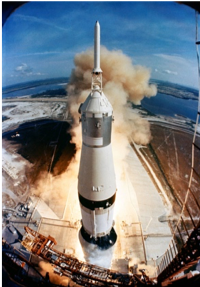By Pieter Chys – Data Scientist
Fifty years ago, the mighty Saturn V rocket sent mankind to the moon on Apollo 11. A milestone for humanity! Regrettably, we did not get very far since then and Mars is still out of reach for now. However, the Saturn V rocket was engineered using slide rule and hand calculations but these days are long since gone, we do have made massive strides forward in computing power due to the advent of computers.
For example, a typical laptop has more computing power than the NASA team had available to compute the trajectories for the Apollo missions. Curiously, computer chips have achieved such a high degree of miniaturization that the physical limit of downsizing has been reached.
But don’t worry yet, in the waiting room of computing prowess a new animal is already getting nervous: the quantum processor!
Quantum excursions
At InfoFarm, lately, we have been looking into quantum computing, the stuff that will be done on quantum processors. Quantum computing is a new field which is rapidly developing and covers both hardware and methodology scope.
Quantum processors constitute the hardware on which one will perform quantum computing operations. Successful development of quantum processors constitutes a major hurdle currently, after all, we are dealing with quantum processes we need to learn to control and manipulate at the nano-engineering level.
Because quantum processors work differently than classical processors, programming techniques and algorithms will also be fundamentally different. In fact, quantum computing techniques and algorithms constitute an active field of research and development in both academia and industry.
At InfoFarm, we are of course very interested in new quantum programming approaches and algorithms which may play an important role in the fields of machine learning and artificial intelligence. But, what is this quantum computing now exactly?
What’s the fizz?
Qubits obeying quantum principles
In a quantum processor, we have registers of quantum bits very much like bit registers in a classical computer. The important part is of course in the quantum bit part: A quantum bit or simply qubit is the analogue of a classical bit in a classical processing unit (CPU).
Qubits though work drastically differently in many ways from classical bits and are responsible for the untapped but glooming potential of quantum computing. In following sections, we highlight the basic quantum principles underlying quantum computing.
principle 1: Quantum superposition
A classical bit can be either in the 0 or 1 state but not in both states at the same time. However, a qubit can take on both 0 and 1 values at the same time! This phenomenon is called quantum superposition. When you have more than 1 qubit in a quantum register, the superposition principle extends to more than one qubit.
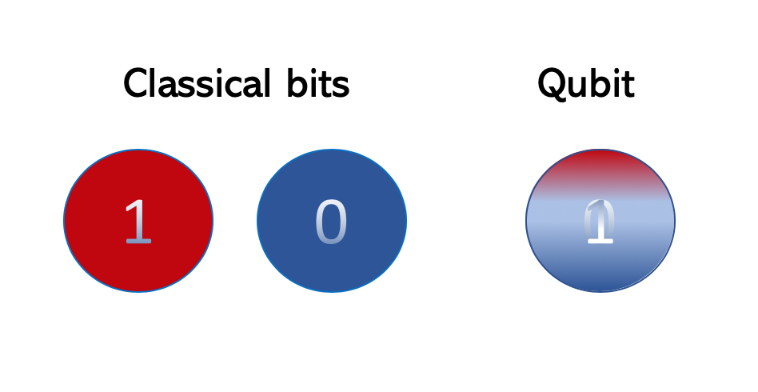
principle 2: Quantum entanglement
A second phenomenon is quantum entanglement wherein two or more qubits carry a kind of hidden correlation between their states. In a classical computer, the state of one bit (0 or 1) never influences the states of other bits in a register. For qubits, this is no longer the case and entanglement is like an invisible force influencing all qubits in the register at the same time. Two qubits from a quantum register set up a 2-dimensional analogue and this extends to higher-dimensional qubit combinations as well.
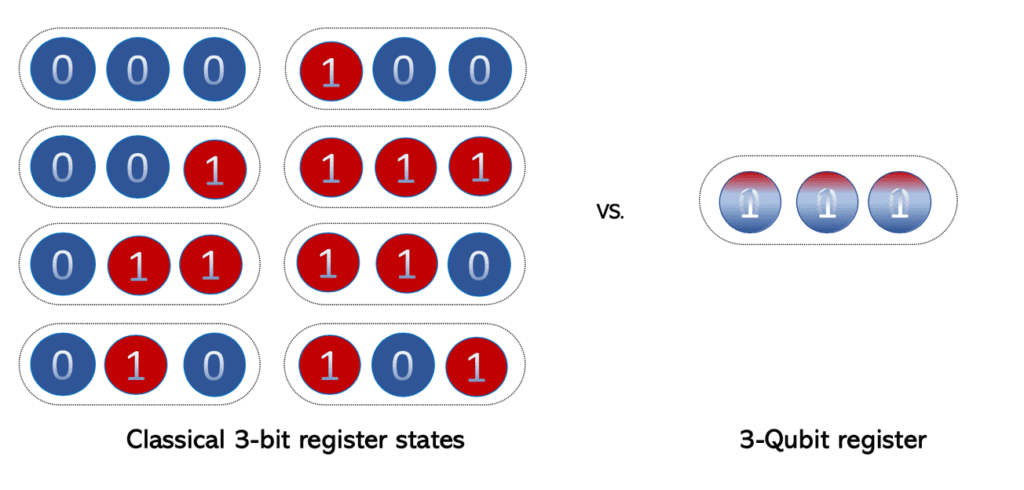
principle 3: Quantum measurement
Third, it is impossible to actually measure the quantum state of a quantum register, quantum mechanics states the actual quantum state collapses when you try to measure it. However, what we can do is measure and collapse the quantum register state into classical states and, repeat this many times to obtain probabilities for the preferential states.
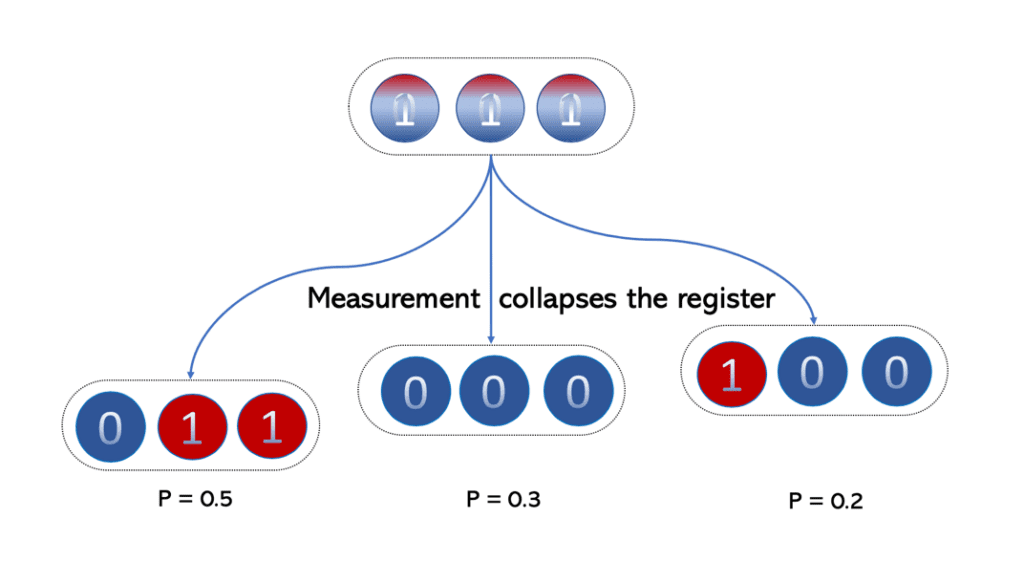
Quantum supremacy blinking
Sprint to supremacy
Both quantum superposition and entanglement make quantum processors incredibly powerful computing devices, at least theoretically. It is believed that major players such as IBM, Google and Microsoft have at least prototype quantum processors which rival or exceed classical supercomputers.
Existing proof is that Google leaked in 2019 data from experiments with an experimental 54-qubit processor (the Sycamore chip). Although the computational operations performed were trivial, the speedup explained versus classical supercomputers is correctly assessed by Google.
It is claimed 200 seconds were only needed by the 54-qubit processor whereas the best classical supercomputers would need 10.000 years. It may indeed have been the first illustration of so-called quantum supremacy.
Magic scaling
Let us illustrate the potential scope of quantum processors more explicitly now. With 2 qubits, you get a superposition of 4 unique mixed states, with 3 qubits there will be 8 unique mixed states and so it goes on… A register of n qubits scales with 2n unique mixed states, because 2n unique combinations exist, the n-qubit register can be in a superposition of 2n unique states at the same time. The classical n-bit register on the other hand can only be in 1 of its possible 2n bit combinations at a given instant.
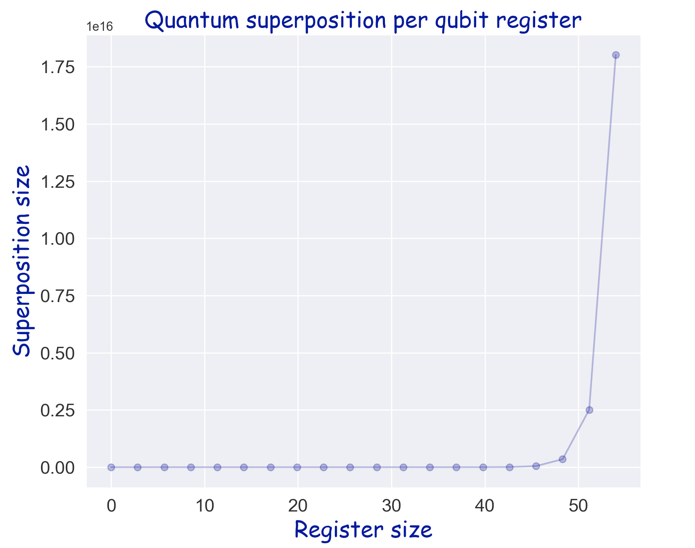
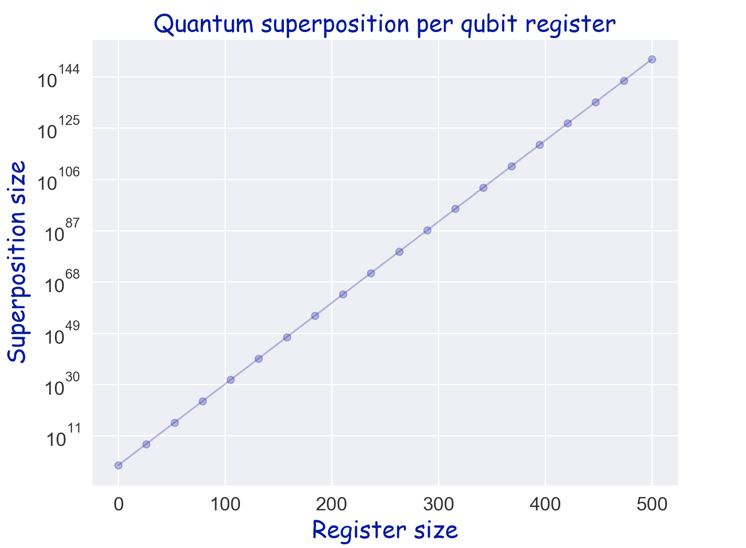
For computing purposes, the classical CPU has to work with this single n-bit combination in register in a sequential fashion. Obviously, in the quantum register, one can manipulate all 2n states instantaneously. Notice too that the difference with a classical CPU increases the greater the size of the register (higher value of n).
Thus, the higher the dimension of your computational problem and the more complex the logic needed to be performed, the more advantageous the usage of quantum processors becomes. It needs to be reminded that not all problems allow to be formulated in the quantum realm, only certain types of problems may ultimately be tackled by quantum computations.
But some of these pertain to important scope within human society, quantum computers in all likelihood will easily decode all current passwords and thus revolutionize the field of cybersecurity.
Exciting times
In summary, once quantum computing hardware will leave the realm of prototyping, the quantum properties of qubits will ensure the technology is in a totally different ballpark from classical computers. When dealing with a problem needing 8 qubits you are dealing with 28 = 256 unique combinations which indeed is also manageable by a classical CPU.
But, if a major manufacturer succeeds in building a working 400-qubit processor, this quantum processing unit (QPU) will be able to compute with a state vector of 2400 states. To put this into perspective, a lower bound estimate for the number of possible chess game positions is 10120 which more or less equals 2400.
Thus, a 400-qubit quantum processor would be able to hold all possible chess games in its register to perform logic with it. And let’s be honest: Which classical supercomputer will get close to that?
